#Elightwalk Extensions
Explore tagged Tumblr posts
Text
Magento Google XML Sitemap Generator For Boosting E-Commerce Success

In the world of e-commerce, visibility is critical. The more accessible your online store is to search engines, the better the chances of attracting potential customers. That's where the Google XML Sitemap comes into play. If you're using Magento for your e-commerce business, this tool can be a game-changer for your website's performance and Google rankings.
What is a Google XML Sitemap generator?
A Google XML Sitemap generator creates XML sitemaps for websites, which provide search engines with a list of URLs. That helps search engine bots navigate and index the site's content more efficiently, enhancing a website's visibility in search engine results and contributing to better SEO. These generators are helpful for website owners to ensure all relevant URLs are included for optimal discoverability.
Boosting Website Performance
One of the primary benefits of using a Google XML Sitemap with Magento is the boost in website performance. When search engines can navigate your site efficiently, your pages are more likely to be indexed and ranked accurately. That leads to a better user experience, faster load times, and increased user satisfaction. Faster, smoother, and well-structured websites are more likely to convert visitors into customers.
Higher Google Rankings
Reaching the top of Google's search results is the ultimate goal for any e-commerce business. The Google XML Sitemap is your secret weapon in this quest. When search engines comprehensively understand your website's structure and content, they can match user queries more effectively, potentially catapulting your site to the top of relevant search results.
Submitting Your Sitemap to Google Search Console
Submit your Google XML Sitemap to Google Search Console to optimize your website. This step ensures that Google knows your sitemap and can regularly check it for updates. By doing so, you're helping Google gain a better understanding of your website's changes and evolution.
Conclusion
In the world of e-commerce, the Magento Google XML Sitemap generator is the right choice for your business. It's the bridge between your online store and search engines, a tool that enhances your website's performance and boosts your Google rankings. Effective communication of your website's structure increases discoverability. So, if you're using Magento for your e-commerce business, don't underestimate the power of a well-optimized Google XML Sitemap – it's the key to unlocking your online store's full potential.
#Google XML Sitemap#Sitemap Generator#Google XML sitemap generatore#Magento Extension#Elightwalk Extensions#Magento plugins
0 notes
Text
1 note
·
View note
Text
How to set up an Elightwalk Magento 2 Social Login
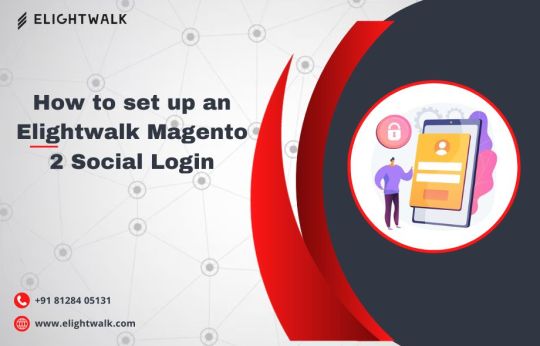
Enabling Elightwalk’s Magento 2 Social Login extension involves multiple steps that may vary based on version and instructions. Here’s a general guide:
Install the Extension:
Follow the installation instructions provided by the Elightwalk Magento 2 Social login. This often involves using Composer, Magento Marketplace, or manually uploading files to your server.
Install via composar Copy code and past
composer require elightwalk/magento2-social-login php bin/magento module:enable Elightwalk_Core Elightwalk_SocialLogin php bin/magento setup:upgrade php bin/magento setup:di:compile php bin/magento setup:static-content:deploy php bin/magento cache:clean php bin/magento cache:flush
Configuration Path
From Magento Admin, select Store > Settings > Configuration > Elightwalk Extensions > Social Login.
Create Social Media Applications:
From Magento Admin, select Store > Settings > Configuration > Elightwalk Extensions > Social Login.
To enable Social Login, you must create applications on the respective social media platforms (e.g., Facebook, Google, Linkedin) to obtain API keys and secrets.
Go to their developer console for each platform and create a new project or application. Follow the platform-specific instructions to generate API keys and secrets.
Configure Elightwalk Social Login in Admin:
From Magento Admin, select Store > Settings > Configuration > Elightwalk Extensions > Social Login.
Log in to your Magento 2 Admin Panel.
Navigate to Stores > Configuration > Elightwalk > Social Login.
Enter the API keys and secrets obtained from the social media platforms in the appropriate fields.
Configure additional settings such as button styles, the display of social login options, and any specific behavior you desire.
Sign In Social Account Google Client ID & Secret
Facebook Sign In
Linkedin Client ID & Secret
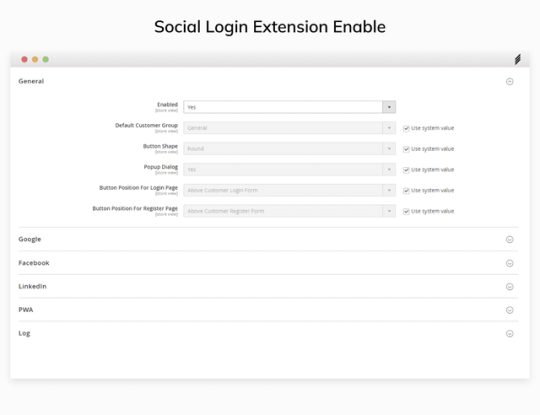
Enable Social Login Buttons:
In the configuration settings, enable the social media platforms you want to offer for Social Login.
Choose the locations where the social login buttons appear, such as on the login page, checkout page, or customer account page.
Customize User Experience Button Shape: Squre OR Rectangle
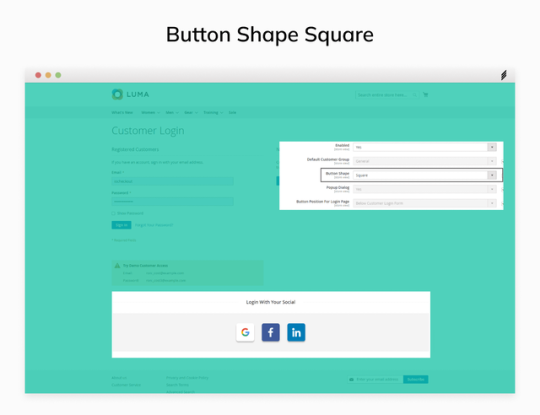
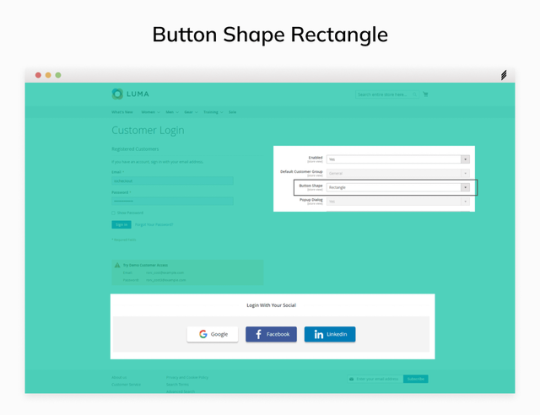
Button position: Above OR Below
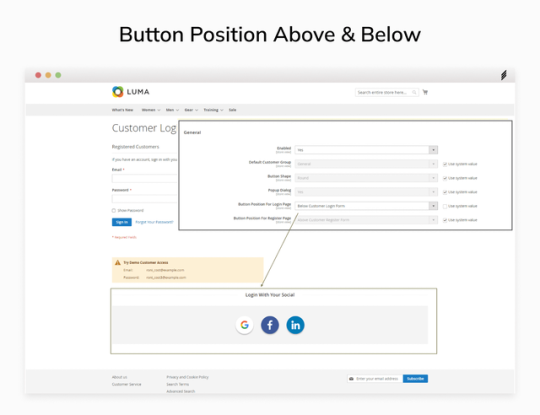
Button position: Landing Page
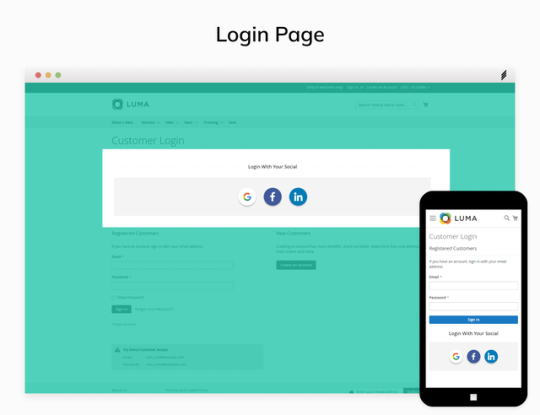
Test Social Login Functionality:
Test the functionality by navigating to the login page after configuring the extension and enabling social login buttons.
Click on the social login buttons to ensure they redirect users to the respective social media platforms for authentication.
Authenticate and confirm successful login to your Magento 2 store.
Monitor and Maintain:
Regularly monitor the social login functionality to ensure it continues to work smoothly.
Keep the social media API credentials secure and update them if needed.
Download the Elightwalk Magento 2 Social Login extension now! For any inquiries regarding the Magento 2 Social Login extension, be sure to consult the comprehensive documentation guide provided. Access the latest features, installation instructions, and customization details to enhance your Magento 2 store’s user experience. Explore the documentation guide for seamless integration and optimized performance.
#magento 2 social login#social login extension#magento 2 extension#elightwalk magento 2 social login#elightwalk extension
1 note
·
View note
Text

Simplify Customer Sign-in with Magento 2 Social Login Extension
Introduction:
In today's competitive e-commerce landscape, providing a seamless and convenient shopping experience is crucial for attracting and retaining customers. One effective way to enhance your online store's user experience is by implementing a Magento 2 Social Login extension, and Elightwalk's solution is here to make it even easier.
Key Features of Elightwalk's Magento 2 Social Login Extension:
1. Quick Login:
Elightwalk's extension offers a quick and hassle-free login process. Customers can sign in using their Google, Facebook, or LinkedIn accounts in just a few clicks. That reduces the friction often associated with the traditional registration process.
2. Smooth Process:
The extension ensures a smooth and intuitive login experience. Users can seamlessly connect their social media accounts to your store without technical hiccups, creating a positive impression.
3. Simple Installation:
Elightwalk has made installation a breeze. You don't need to be a tech guru to set up this extension. A straightforward installation process gets you up and running in no time.
4. Attracts Customers:
Elightwalk's Magento Social Login extension offers a compelling feature to help you achieve just that. Allowing customers to sign in using their Google, Facebook, or LinkedIn accounts simplifies the login process and attracts potential customers.
Why Elightwalk's Magento 2 Social Login is the Right Choice for Your Business:
1. High-Quality E-commerce Experience:
Elightwalk's extension ensures that your customers enjoy a high-quality shopping experience. The quick and convenient login process sets the tone for a positive interaction with your online store.
2. Boost Shopping Experience:
A simplified login process leads to a boosted shopping experience. Customers can focus on browsing and purchasing instead of dealing with complicated registration forms.
3. Increase Web Traffic:
By offering social login options, you make it easier for users to join your site, increasing their chances of returning and driving more web traffic. Word-of-mouth recommendations can also lead to more visitors.
4. Smooth Login Process:
The smooth login process is a critical feature that makes Elightwalk's extension stand out. It's a vital component for customer satisfaction and retention.
Conclusion:
The Magento 2 Social Login extension from Elightwalk is an excellent investment for any e-commerce store. It streamlines the login process, provides a great user experience, and helps to attract and retain customers. Adding this extension to your online store is the perfect way to improve its functionality and convenience.
Take advantage of the opportunity to make your customers' shopping journey more enjoyable. Implement Elightwalk's Magento 2 Social Login extension and watch your web traffic and sales soar.
Feel free to modify and expand upon this content to suit your specific audience and marketing goals. Add images and further details about installing and configuring the extension to make the blog post more informative and engaging.
#Magento Extension#Social Login extension#Magento 2 Social login#Social Login#Elightwalk Extension#Magento Social login Extension
0 notes
Text
How to secure my Magento store?

Running a successful Magento store is no easy feat, and the last thing you want is for your hard work to be compromised by security threats. Protecting your customers' data is crucial as online shopping becomes more prevalent. In this blog post, we'll discuss the steps you can take to secure your Magento store and safeguard your business and customers from potential cyber-attacks.
Using a Secure Hosting Provider
Select a hosting provider with strong security measures and features, such as SSL certificates, regular security updates, and robust firewalls, to protect sensitive customer data.
Keeping Magento Updated
Regularly update Magento software, themes, and extensions to patch security vulnerabilities and protect your e-commerce website from potential cyber threats. It is also essential to periodically monitor for any security patches Magento releases and apply them promptly to keep your online store secure.
Implementing Strong Password Policies:
Enforce strict password policies for all user accounts, including administrators, employees, and customers. Encourage using complex passwords containing a mix of letters, numbers, and special characters to improve security.
Securing Payment Gateways:
Ensure that payment gateways are securely integrated into your Magento store. Utilize trusted payment processors and follow best practices for securing online transactions, such as encrypting sensitive payment information.
Implementing Security Extensions:
Explore reputable extensions or plugins specifically designed for Magento. These extensions can provide additional layers of security, such as malware scanning, firewall protection, and intrusion detection.
Regular Security Audits and Monitoring:
Conduct periodic security audits of your Magento store to identify vulnerabilities, misconfigurations, and potential security weaknesses. Implement continuous monitoring systems to detect and respond to suspicious activities promptly.
By integrating these measures into your Magento store security strategy, you can enhance protection against cyber threats, safeguard sensitive data, and fortify the overall security posture of your e-commerce platform.
Elightwalk specializes in Magento development services, offering tailored solutions to meet your e-commerce needs. Our team of expert Magento developers is highly skilled and experienced in leveraging Magento technology to enhance your online store's performance. Whether you require customizations, optimizations, or ongoing support, our dedicated developers will seamlessly manage your Magento store, ensuring smooth operation and optimal functionality.
Contact us now for more information about your Magento development requirements, and hire our experienced Magento developers to elevate your e-commerce business to new heights. With Elightwalk, you can trust our expertise and commitment to delivering exceptional results for your Magento store.
#hire magento developer#hire dedicated magento developers#magento store#magento store secure#Magento security
1 note
·
View note
Text
How to optimize my Magento store for SEO?

Magento is a powerful e-commerce platform renowned for its flexibility, scalability, and extensive customization options. However, to fully harness its potential and attract organic traffic, it's imperative to implement effective SEO strategies tailored to Magento's unique architecture and features.
In this Guide we will walk you through a comprehensive SEO optimization plan specifically designed for Magento stores. From technical optimizations to content strategies. we'll cover everything you need to know to elevate your store's visibility and drive targeted traffic from search engines.
Here are some Important steps to optimize your Magento store for SEO:
Choose an SEO-friendly Magento theme: Select a lightweight, fast-loading, mobile-responsive theme optimized for SEO. Clean code and proper structure can positively impact your website's performance in search engines. Customize your theme for a mobile-responsive site, including page layout, font style, font size, colour combination, etc.
Optimize metadata:
Ensure each page on your Magento store has unique and relevant metadata, including meta title tags, meta descriptions, and meta keywords.
Use keywords strategically in these elements to describe each page's Content accurately.
Add Schema Code Faq schema, blog schema, organization, canonial tag, OG tag, and Twitter tag.
Create unique and high-quality Content: Write High-Quality Content as per Google updates: high-quality, informative, helpful Content using images, colour and GIF Video.
Optimize product pages: Each page should have a unique and descriptive title tag, high-quality images, detailed descriptions, and customer reviews. Implement schema markup JSON to provide search engines with additional information about your products.
Optimize URL structure: Configure Magento to generate SEO-friendly URLs that include relevant keywords and are easy for users and search engines to understand. Avoid using lengthy URLs with unnecessary parameters or symbols.
Improve site speed: Improve your Magento store by enabling caching, compressing images, minimizing JavaScript and CSS files, and using a content delivery network. Increased loading times can improve the user experience and search engine rankings. Use these strategies to optimize your website performance.
Implement XML sitemap: Generate an XML sitemap for your Magento store to help search engines better index your site. Please submit it to Google Search Console to ensure search engines regularly update and crawl your sitemap.
Optimize for mobile: Ensure your Magento store is fully optimized for mobile devices. Mobile friendliness is a crucial factor in search engine rankings. Use responsive design techniques to provide a seamless browsing experience across all devices.
Enable SSL security: A Magento store should be protected with an SSL certificate, which encrypts data between the website and visitors' browsers, safeguarding sensitive information like login passwords and personal data. Installing SSL can boost search engine results, attracting more organic visitors.
Monitor and analyze performance: Use tools like Google Analytics and Google Search Console to track your Magento store's performance, identify improvement areas, and measure the effectiveness of your SEO strategies. Regularly review metrics such as organic traffic, keyword rankings, and conversion rates to optimize your SEO efforts over time.
Implementing these strategies can significantly improve the site speed and search engine visibility of your Magento store, thereby enhancing user experience and driving more organic traffic. Elightwalk Provide magento developers for hire as per your business needs. Hire magento developer and Get ready to optimize your Magento store for SEO success and unlock new opportunities for growth and profitability!
#magento store optimize#magento store#magento website#hire magento developers#magento developers#hire dedicated magento developer#hire magento 2 developer
1 note
·
View note
Text
Hire Expert Magento Developers for Your E-commerce Success

Magento is the top choice for e-commerce business owners who want a robust and customizable platform. Its extensive features, including multi-store management, advanced search capabilities, and mobile responsiveness, make it a popular choice among retailers looking to enhance their online presence. Additionally, Magento offers a vibrant community of developers and a vast marketplace of extensions and themes, providing endless possibilities for growth and innovation in the e-commerce industry.
Why Invest in Expert Magento Development?
Unleash Magento's Full Potential: Magento offers many features and functionalities, but unlocking its full potential requires in-depth knowledge and experience. Expert developers can tailor the platform to your unique business requirements, creating a customized and high-performing store.
Enhanced Security and Scalability: Your online store must be secure and scalable to handle traffic spikes and growth. Expert developers ensure robust security measures and build your store with scalability in mind, preventing performance bottlenecks as your business flourishes.
Seamless Integration and Customization: Integrate your store effortlessly with various payment gateways, shipping providers, and marketing tools. Expert developers can handle complex integrations and tailor Magento to fit your existing systems and workflow seamlessly.
Reduced Costs and Improved ROI: While hiring expert developers requires an initial investment, their expertise can save you significant costs in the long run. They can ensure efficient development, avoid costly mistakes, and optimize your store for conversions, leading to a higher return on investment.
Maintenance and Ongoing Support: A dedicated development team can keep your store updated, secure, and performing optimally. Ongoing support lets you focus on your business while the developers care about technical aspects.
Finding the Right Magento Development Team:
Identify Your Project Needs: Define your specific requirements, budget, and timeframe. Are you building a new store, optimizing an existing one, or needing ongoing maintenance?
Research and Compare Developers: Look for experienced Magento developers with a proven track record and positive client testimonials. Consider portfolios, certifications, and expertise in relevant areas like B2B e-commerce or specific industry integrations.
Communication and Collaboration: Please make sure communication is a priority. Choose developers who actively listen to your needs, understand your business goals, and can offer transparent communication throughout the project.
Cost and Value: It's essential to evaluate the long-term benefits of each developer rather than just focusing on the lowest price. Investing in experienced developers can result in significant cost savings and operational efficiency in the long term. It is essential to consider developers' expertise and track record before deciding.
Hire skilled Magento developers; you can unleash your e-commerce platform's full potential. This will allow you to offer exceptional customer experiences, leading to sustainable growth for your business. Remember that working with experienced developers is not an expense but a strategic investment in the long-term success of your online store.
At Elightwalk, we understand that your online store is more than just a website - it's the digital engine of your business growth.
Our highly skilled Magento developers are dedicated to bringing your e-commerce vision to life. Hire a developer from Elightwalk for just three steps: Inquiry, Trial Run, and hire a developer for your Magento website development. Contact Elightwalk today and let our expert developers help you achieve your e-commerce goals.
#hire skilled magento developer#hire magento developer#hire expert magento developer#magento development#magento website development
1 note
·
View note
Text
What are some best practices for testing React components?

React has become a popular framework for building user interfaces due to its efficient rendering and reusable component structure. The quality of React components is ensured by testing, just like any software development process. We will explore some of the most effective techniques for testing React components to assist developers in creating dependable and error-free applications.
Unit Testing: React component testing begins with unit testing. It involves testing each component in isolation without any external dependencies. Unit tests ensure that each piece functions as expected and help catch any errors in isolation. Developers can use popular testing libraries like Jest or Enzyme for unit testing.
Jest is a JavaScript testing framework with a simple and easy-to-use API for testing React components. It also offers features like snapshot testing to check for changes in the rendered part. On the other hand, Enzyme is a JavaScript testing utility for React that simplifies the testing of React components by providing an intuitive API for traversing and manipulating React components' output.
Integration Testing: Integration testing focuses on verifying the smooth collaboration and interaction among various components to ensure their cohesive functionality. It is crucial in React applications as components often rely on each other for data exchange. Tools such as Cypress offer a powerful API for crafting end-to-end tests, enabling the execution of integration testing.
Mocking Dependencies: React components rely on external dependencies like APIs or databases for data retrieval. In such cases, it is helpful to mock these dependencies during testing. Mocking allows developers to simulate different scenarios and data responses, making testing components' behaviour in different methods easier. For example, a mock API response can help test edge cases like network errors or empty data responses.
Test Coverage: Test coverage is an essential metric to determine the effectiveness and completeness of the testing process. It provides visibility into which tests cover parts of the codebase and which do not. A good test coverage ensures that all critical paths in the code are tested, reducing the chances of undiscovered bugs.
Use React Testing Library: A simple and effective way to test React components is provided by React Testing Library, an open-source testing library. It encourages testing features in a way that reflects how users interact with the application. This approach leads to more robust and meaningful tests that mimic how users experience the application.
Use Test-Driven Development (TDD): Test-driven development is a software development methodology where tests are crafted before writing the actual code. This approach ensures the code is inherently testable, providing extensive test coverage for all features and edge cases. Additionally, TDD fosters the development of modular, maintainable, and reusable code.
Use Continuous Integration (CI): Continuous Integration (CI) is like a system that automatically checks if new code fits well with the existing code. This helps ensure everything works smoothly, and it catches them early if there are any problems. It's an important part of agile development because it helps find and fix issues quickly.
In conclusion, testing React components is essential for crafting high-quality applications, and at Elightwalk, we boast a dedicated team of React.js developers proficient in implementing these best practices. Following these guidelines ensures our applications are thoroughly tested, producing more robust and reliable software.
This commitment to testing identifies and resolves bugs and enhances our developers' confidence, culminating in an unparalleled user experience. With the rising popularity of React, our investment in meticulous testing reflects our dedication to delivering top-tier applications to our users.
1 note
·
View note
Text
Elightwalk's Magento 2 Social Login Extension

If you want to improve customer experience, increase conversions, and gather valuable customer data, elightwalk's Social Login Extension for Magento 2 is necessary. Easy installation, customizable features, and compatibility with all devices and platforms set it apart. For any store owner of a store in Magento 2, this extension is an essential tool.
Elightwalk's Magento 2 Social Login Extension comes in. This powerful tool lets Customers access your online store using their social media accounts, including Facebook, Google, and Linkedin. The hassle-free login process saves customers time and prevents them from having to remember multiple login credentials.
1. How does Social Login work?
When you click the "Log in with Facebook" or any other social media button, it redirects you to the chosen platform. At this stage, you are not sharing personal information with the website or app; you are simply verifying your identity with the social media platform.
After selecting the social media platform you want to use, you will be asked to enter your username and password. If you enter the correct details, the social media platform will request permission to share your account information with the website or app you are attempting to log into.
2. How do you install elightwalk Social Login?
To install the elightwalk Social Login extension for Magento 2, follow these steps:
a. Purchase and download the elightwalk Social Login extension from the elightwalk website or another authorized source.
b. Upload the extension files to your Magento 2 store directory using an FTP client or file manager.
c. Run the following commands in your Magento 2 root directory:
Composer require elightwalk/magento2-social-login
php bin/magento module:enable elightwalk_Core elightwalk_SocialLogin
php bin/magento setup:upgrade
php bin/magento setup:di:compile
php bin/magento setup:static-content:deploy
php bin/magento cache:clean
php bin/magento cache:flush`
d. Log in to your Magento 2 admin panel and navigate to Stores > Configuration > elightwalk > Social Login.
e. Configure the extension settings, such as turning on/off specific social media platforms, customizing the display, and setting API credentials.
f. Save your configuration and clear the cache.
3. How do you install elightwalk Social Login using GraphQL?
To install elightwalk Social Login using GraphQL, you need to follow these steps:
a. Install the GraphQL module for Magento 2 if it still needs to be installed.
b. Configure the GraphQL endpoint in your Magento 2 admin panel.
c. Install the elightwalk Social Login extension following the steps mentioned above.
d. Use the GraphQL API to interact with the elightwalk Social Login extension. Refer to the extension's documentation or elightwalk's support for specific GraphQL query examples.
4. Configuration of elightwalk Social Login
After installing the elightwalk Social Login extension, you can configure it by following these steps:
a. Access the Social Login settings in your Magento 2 admin panel by navigating to Stores > Configuration > elightwalk > Social Login.
b. Enable the extension and select the social media platforms you want to offer for social login.
c. Enter the API credentials for each social media platform you enabled. These credentials can be obtained by creating an application on the respective social media developer platforms.
d. Customize the display options, such as button styles, positions, and text.
e. Save the configuration and clear the cache.
5. Social Login does not appear on the website.
If the social login does not appear on your website, you can try the following troubleshooting steps:
a. Clear the cache in your Magento 2 admin panel by navigating to System > Cache Management and clicking the "Flush Magento Cache" button.
b. Check if the elightwalk Social Login extension is properly installed and enabled. Confirm that you have successfully followed the installation steps.
c. Verify that the API credentials for the social media platforms are correct and have not expired.
d. Ensure the social login buttons are enabled and configured correctly in the extension settings.
e. Check for any conflicts with other extensions or customizations on your website. Disable other extensions temporarily to see if the social login appears.
f. If the issue persists, contact elightwalk support or consult their documentation for further assistance.
elightwalk's Magento 2 Social Login Extension offers store owners complete control over the login and registration process. They can choose which social media platforms to enable, customize the registration fields, and decide whether to allow guest checkout.
Take advantage of the opportunity to enhance your online presence and boost your business with the power of social media. Get elightwalk's Magento 2 Social Login Extension today and take your online store to the next level!
1 note
·
View note
Text
Tips for Integrating Magento 2 Social Login

Enable SSL: Social media platforms require an SSL certificate to ensure a secure connection for authentication.
Choose the right social media platforms: Integrate the social media platforms that are most relevant to your target audience. Doing so will improve user experience and ensure you collect valuable data from your target customers.
Customize the social login buttons: Customize the look and feel of social login buttons to match your website design. This will help ensure a seamless and professional user experience.
Test the social login feature: Test the social login feature thoroughly before launching it on your live website. Make sure it works seamlessly and provides a great user experience.
Display social login prominently: Social login options on your website's login and registration pages. This will increase the visibility of the feature and encourage users to sign up or log in using their social media accounts.
Monitor social login usage: Monitor the use of the social login feature to understand how customers interact with it. This information can help you optimize the quality and improve the customer experience.
By integrating the Magento 2 Social Login into your online store, you can provide shoppers with a faster and more convenient way to create accounts on your website. This can help boost customer engagement, improve customer loyalty, and increase online conversions. So don't wait any longer; start today with Magento 2 Social Login and take your online store to the next level.
Elightwalk's Magento 2 Social Login Extension is designed to allow users to log in to your online store using their social media accounts. This extension simplifies the account access process and enhances security by enabling customers to log in using their Facebook, Google, or LinkedIn credentials. With this streamlined login feature, users can quickly sign up and access your website, making it a convenient and secure option for your customers.
1 note
·
View note
Text
Enhancing Email Deliverability in Magento 2 with SMTP
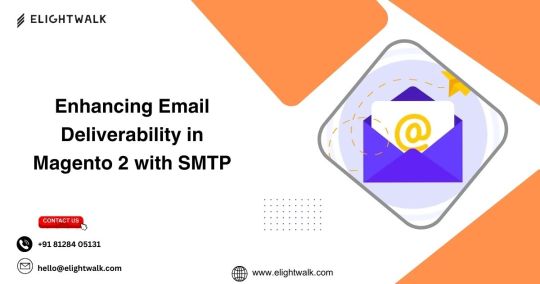
1. Importance of Email Deliverability in Magento 2:
Effective email communication is essential for Magento 2 stores. It influences customer engagement, order notifications, and marketing campaigns. Explore the significance of email deliverability to ensure messages reach intended recipients' inboxes.
2. Challenges Faced in Ensuring Email Deliverability:
Explore the common challenges businesses face concerning email deliverability in Magento 2. In this section, we could discuss issues such as emails being marked as spam, delays in email delivery, and unsuccessful email notifications. It is essential to emphasize the potential impact of these issues on customer satisfaction and the store's reputation.
3. Understanding Email Deliverability in Magento 2
Email deliverability in Magento 2 refers to the successful delivery of emails to intended recipients. This relates to the bounce rates of emails and the sender reputation of the domain name used. Good email deliverability is essential as it ensures that marketing messages reach their intended audiences, increasing the chances of sales and engagement.
4. SMTP and Its Role in Enhancing Email Deliverability
Simple Mail Transfer Protocol (SMTP) is crucial for efficiently transferring emails between servers. It is the industry standard for sending and receiving emails reliably and securely. Using SMTP can provide several benefits to e-commerce stores that use Magento 2, the most notable of which is improved email deliverability.
By establishing a direct connection between the sender and recipient, SMTP ensures that messages are delivered faster and more accurately while providing higher levels of security. Additionally, SMTP ensures that email content is encrypted, making it less likely to be blocked by spam filters or other security measures.
SMTP extension can provide customers with various resources that help them manage their emails more efficiently. With its ability to monitor the arrival times of messages, SMTP can improve email deliverability and notify users if a message is rejected or delayed. Overall, SMTP is a robust protocol that can significantly enhance the effectiveness of email delivery. It also offers a more secure and reliable solution for email communication.
5. Setting up SMTP in Magento 2
The process of integrating SMTP in Magento 2 requires specific configurations and the selection of a reliable SMTP provider. Elightwalk provides SMTP servers tailored to e-commerce stores. Our SMTP extension ensures fast and secure delivery of emails.
6. Improving Email Deliverability in Magento 2
For Magento 2 users, there are a few best practices to increase the probability of successful email deliverability. These include ensuring emails are sent from an authenticated domain, avoiding generic 'from addresses', monitoring email bounce rates, and scheduling emails during off-peak times.
Additionally, setting up SPF and DKIM records for domains can help authenticate senders and create recognizable sender identities. Lastly, external third-party email delivery services can help address email deliverability issues. Magento 2 users can improve their email deliverability by following these best practices.
#smtp extension#smtp#magento 2 smtp#magento 2 extension#email deliverability#email deliver extension
1 note
·
View note
Text
Discover the power of Magento SMTP (Simple Mail Transfer Protocol) with features and functionalities that enhance email reliability and security. Elevate your customer communication using Magento SMTP.
0 notes
Text
#Magento Extension#Social Login extension#Magento 2 Social login#Magento Social login Extension.#Social Login
0 notes
Text
Discover how the Magento Google XML Sitemap Generator can supercharge your e-commerce success by enhancing search engine visibility and optimizing your online store's performance.
1 note
·
View note
Text

Elightwalk's dedicated SMTP (Simple Mail Transfer Protocol) Extension is meticulously tailored for the e-commerce environment. It facilitates more streamlined and dependable email correspondence between your online store and its clientele. This extension empowers you to choose an SMTP host that leverages your website as the conduit for dispatching all outgoing emails.
0 notes